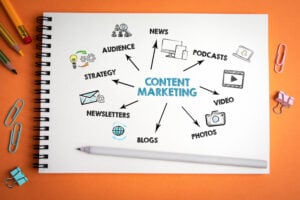New to online marketing? All it takes is a shrinking budget to make you wonder if there’s a fast, efficient way to get website traffic. Marketing is always a gamble, but some strategies offer a higher rate of results. Pay-per-click ads are one option for small businesses that want to boost visibility and measure marketing efforts.
What is pay-per-click advertisement?
In pay-per-click (PPC) marketing, you pay for ads to appear in prime spots on websites and search results. You pick the keywords to target and decide the max amount you’re willing to pay for a click. This proposed amount is your maximum cost per click (CPC). Budget-conscious marketers like this model because fees only kick in when someone clicks an ad.
Let’s say you set a monthly limit of $200 with a max CPC of $2.00. It would take at least 100 clicks to deplete your budget. That means you’re paying $200 for 100 leads. Of course, not every ad click turns into a paying customer. But if you convert even 10 percent of those clicks and each customer spends more than $20, you’ve already made a profit.
How does PPC marketing work?
A wide range of web publishers and social media sites host PPC ads. PPC ads carry a “sponsored” label and appear above organic search results. On social media sites, PPC ads often look like a regular post on a news feed. The two most common forms of PPC are auction and flat-rate models. In both cases, you create a fixed budget and choose the keywords you want to target. The main difference is real-time auctions, such as Google AdWords, depend on a winning bid.
The PPC platform provides a suggested bid for your keywords. When someone conducts a search, it triggers an auction between bidders with related keywords. The platform awards prime ad space based on the bidder’s max CPC and quality scores. As a small business owner, you may be skeptical about competing if the best ad space goes to the highest bidder. Sophisticated PPC platforms take other factors into account, such as click-through rate and relevance.
Click-through rate (CTR) is the ratio of ad clicks compared to the number of times your ad gets displayed. The average CTR for ads hosted through Google Adwords is about two percent, according to Wordstream. Relevance measures the quality of your ads and how closely they relate to the landing page. All these factors contribute to your rank and actual cost per click, which may be lower than your bid.
Search engine marketing vs. search engine optimization
Normally, when you look for something online, search engines try to produce the most useful results. For a site to rank well in organic searches, you have to optimize it with relevant content and keywords. Getting high visibility takes a lot of time and effort. You have to regularly update the site and create content that keeps people coming back.
PPC is a type of paid search engine marketing (SEM), which is a non-organic search process. If you already know the basics of search engine optimization (SEO), you may have a lot of doubts at this point. What is pay-per-click marketing useful for? Why would anyone bother with paid searches if you can get traffic using cost-free SEO tactics?
In short, combining PPC and SEO can rev up your online marketing strategy even more. Consider these key factors:
- Short-term lead generation: SEO is a long-term strategy that depends on ongoing content creation. Yet, most websites suffer dips in traffic from time to time as marketing efforts plateau. Running PPC campaigns can help you bring in fresh leads. If your ads lead to quality, optimized sites, your PPC campaigns will thrive and costs will go down.
- Precise targeting: Good SEO keyword research is the backbone of a PPC campaign. By using the right long-tail keywords, you can reduce irrelevant clicks that drag down your conversion rate. Many PPC platforms also let you refine your demographics. That way, you can narrow your audience based on traits, such as age, gender, and browsing activity.
- Performance measurement: PPC marketing gives you complete transparency about the source and frequency of quality leads. With real-time data, you can invest in small trial campaigns and adjust SEO tactics to get better results.
Tips for a successful PPC ad campaign
A well-planned PPC campaign is a good way to separate good leads from bad ones. Out of the thousands of Internet users who see your ad, interested people are more likely to click for information. At the same time, PPC marketing can be chaotic if you don’t have a smart strategy. Here are common reasons PPC campaigns fail.
- Weak landing pages: PPC costs and ranking depend on how consistently you deliver what the user is looking for. Great landing pages are a must, and it’s wise to create different pages for each call to action. Think about the action you want visitors to take. Do you want them to buy something? Download something? Subscribe to your email list? Each landing page should focus on the value you want to offer each customer segment. Too many calls to action become confusing, and visitors end up leaving.
- Boring advertisements: All the effort you put into researching customers and keywords won’t matter if your ad copy puts people to sleep. Make sure headlines have a strong selling point and the ad copy answers a reader’s single most important question. If customers are looking for “brown motorcycle boots on sale,” make it clear that’s what they’ll find on your site.
- Poor performance management: Don’t set up a campaign, and just keep running it over and over. Pay attention to what does and doesn’t convert customers. Try different keyword groups at the same time to see how they stack up. Better yet, use negative keywords to restrict your ads from showing up in irrelevant search results.
PPC marketing isn’t right for everyone, and it takes practice to make campaigns pay off. To grow your bottom line, you need clear goals for paid search marketing. Think about where your customers spend time online before choosing a PPC platform. If online engagement is essential to your business model, you may need to build a social media following before your ads will have real impact.
The most important thing is to avoid comparing your business to others. Don’t give up if you don’t get amazing results right away. PPC is a very individualized style of marketing. Tiny changes in your copy, keywords, or budget could make a huge difference. If you decide to try PPC advertising, approach it like an experiment and be prepared for pitfalls.
A key element of PPC success is having a great website. Upgrade your site with our easy-to-use website builder.



